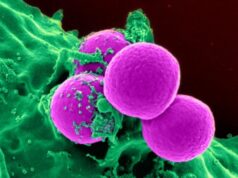A new study revealed that a specific type of immune cell, the Th17 cell, can be stimulated when you chew.Image Credit: Flickr/Alpha
Scientists have shown that chewing your food properly can boost your mouth’s immune system to protect you against illness.
The study led by teams at The University of Manchester and National Institutes of Health in the USA, revealed that a specific type of immune cell, the Th17 cell, can be stimulated when you chew.
The immune cell is important in protecting against bacterial and fungal infections that are commonly found in the mouth .
Although it has long been known that the nutrients from food can support a healthy immune system the findings establish that the action of eating itself is important too.
In other parts of the body, such as the gut and skin, Th17 cells are stimulated by the presence of friendly bacteria; it was previously assumed this was the case in the mouth.
Find your dream job in the space industry. Check our Space Job Board »
However, the team found that damage caused by the abrasion of chewing induced factors from the gums that could activate the same pathways as friendly bacteria and act upon Th17 cells.
However, stimulation of Th17 cells for immune protection can be a double-edged sword: too many Th17 cells can contribute to periodontitis – a common gum disease that is linked to complications in lots of diseases including diabetes, rheumatoid arthritis, heart problems and pre-term birth.
The research was funded by the BBSRC and National Institute of Dental and Craniofacial Research in the United States
Lead researcher and biologist Dr Joanne Konkel, from The University of Manchester, said: “The immune system performs a remarkable balancing act at barrier sites such as the skin, mouth and gut by fighting off harmful pathogens while tolerating the presence of normal friendly bacteria.
“Our research shows that, unlike at other barriers, the mouth has a different way of stimulating Th17 cells: not by bacteria but by mastication. Therefore mastication can induce a protective immune response in our gums”.
In the journal Immunity, the team show that they were able to stimulate increases in Th17 cells in mice by merely changing the hardness of their food, proving that mastication was the critical factor.
But these Th17 cells also had a bad side; “We were also able to show that increased damage from mastication could also exacerbate bone loss in periodontitis”.
She added: “Importantly, because inflammation in the mouth is linked to development of diseases all around the body understanding the tissue-specific factors that regulate immunity at the oral barrier could eventually lead to new ways to treat multiple inflammatory conditions.”
Source: University of Manchester
Research Reference:
Nicolas Dutzan et al. On-going Mechanical Damage from Mastication Drives Homeostatic Th17 Cell Responses at the Oral Barrier, Immunity (2017). DOI: 10.1016/j.immuni.2016.12.010











